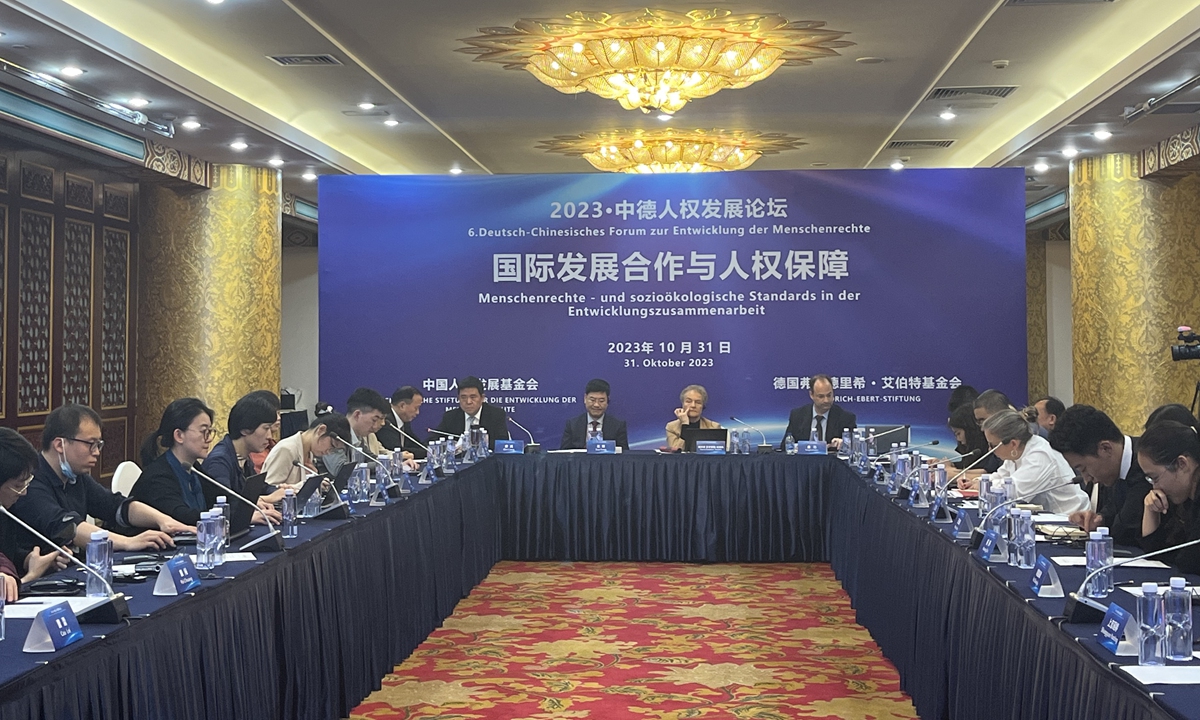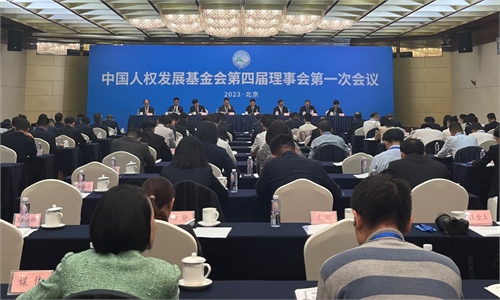Simply emphasizing opposition doesn't work: former German minister at human rights forum, stressing common ground

Experts attend the 2023 China-Germany Forum on Human Rights Development at the Capital Hotel in Beijing on October 31, 2023. Photo: Zhang Changyue/GT
"Accusing each other of being one-sided on human rights issues and simply emphasizing opposition and differences doesn't work. Instead, we should seek what can be done together based on recognizing differences in ideas," said a former senior official from Germany at a human rights forum co-held by a Chinese and a German social organization on Tuesday.
"China and Germany have differences in their perspectives on human rights, but the forum's representatives on both sides don't avoid talking about them because cooperation is very, very important. We have this forum because we want to explore various possibilities and find common ground to build cooperation," said former German justice minister Herta Daubler-Gmelin at the 2023 China-Germany Forum on Human Rights Development held in Beijing.
Daubler-Gmelin pointed out that it's not that the concept of human rights shouldn't be torn apart and separated as collective and individual rights as they are two sides of the same coin and should be equally valued. "We should learn from each other, and personally, I have been reading and learning about various global initiatives China has proposed," said Daubler-Gmelin.
Jointly organized by the China Foundation for Human Rights and German's Friedrich-Ebert-Foundation, this year's forum focused on international development cooperation and invited human rights scholars and officials working to promote global human rights development.
Fu Zitang, former president of Southwest University of Political Science and Law, advocates a shared and collaborative approach to human rights governance.
"There is no perfect ideal model for human rights, nor should human rights be used as a tool to pressure or interfere in the internal affairs of other countries. Different countries should respect, embrace, communicate and learn from each other to collectively enrich the forms of human rights for humanity," said Fu.
The world's human rights situation faces severe challenges given more frequent regional conflicts, headwinds of globalization, the sluggish global economy and the widened development gap, Zuo Feng, a vice chairman and secretary-general of the China Foundation for Human Rights Development, pointed out at the forum.
According to the UN, there are still more than 800 million people worldwide suffering from hunger, and 350 million people are in need of humanitarian assistance. The latest Global Report on Food Crises said that about 258 million people in 58 countries are facing food crises or worse, and in seven countries, people are at risk of famine.
Regardless of the changes in the international situation or the emergence of hot topics, the issue of development should not be ignored and should always remain at the center of the international agenda, said Zuo.
Christine Toetzke, director general of Asia, Latin America, Middle East, Eastern/South Eastern Europe for Germany's Federal Ministry for Economic Cooperation and Development, said no one should be left behind, especially marginalized people such as those with disabilities, children, and sexual minorities. Mechanisms for monitoring implementation of efforts are also necessary.
To boost international development cooperation, China and Europe should view each other as complementary opportunities, said Zhou Taidong, a deputy director of the Center for International Knowledge on Development.
"Chinese development assistance has the advantages of placing more emphasis on infrastructure development, with less bureaucracy and higher efficiency. What's more, China's assistance comes with less additional requirements, allowing the receiving parties more policy freedom," Zhou noted.
China's approach, which prioritizes infrastructure development and economic growth, should not be seen as a threat but rather as an important complement that can work in coordination with European countries, said Zhou.
From 2011 to 2020, nearly half of the development funds from the Organization for Economic Co-operation and Development countries were allocated to social development such as education, gender equality, health, water and sanitation. Investments in infrastructure and manufacturing accounted for only about 20 percent.

